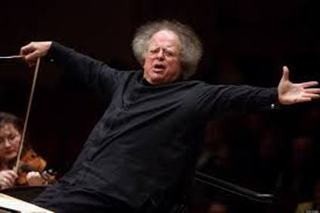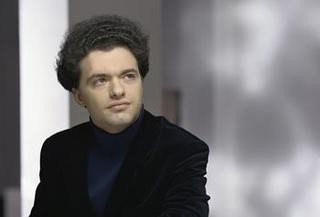|
Back
A Bow To Their Majesties New York
Isaac Stern Auditorium, Carnegie Hall
05/19/2016 -
Mikhail Glinka: Overture to Ruslan and Lyudmila
Sergei Rachmaninoff: Piano Concerto No. 2 in C minor, Opus 18
Pyotr Ilyich Tchaikovsky: Symphony No. 6, in B minor “Pathétique”, Opus 74
Evgeny Kissin (Piano)
The MET Orchestra, James Levine (Music Director Emeritus and Conductor)

J. Levine
The dismal truth is that, had James Levine and Evgeny Kissin played Three Blind Mice with all the wrong notes, the blue-ribbon full-house audience at Carnegie Hall last night would have stood cheering, screaming for “More, more, more!”, Kissin might have responded by playing “Baa Baa Black Sheep” in 7/8 rhythm, and he would have had the same response.
Yes, the audience for three full concerts from James Levine over this next week was ready for legendary sounds. They were suitably quiet during most of the concert of Russian Romantic music, but when the MET Orchestra ended the third movement of the Tchaikovsky symphony with full fortissimo, they burst into applause, thinking the whole thing was over.
All of this was forgivable. Levine was born in Cincinnati, but he is “our” conductor, he built the MET Orchestra into one of the great ensembles of our day, and now that he is down on his luck with medical problems, the Maestro is even more our New York conductor. Add to this Evgeny Kissin, who has not only been recording with Levine for many decades (including Schubert’s music for two pianos, a real gem), but he has transcended the usual repertory and performed Jewish-Russian music, both folk– and classical here and never fails to give several encores.
So, while their success was assured long before the concert began, how did they actually do? Quite well. Even by subtracting the “aura” and the “mystique” and the “homage”, these are two musicians who give their all, whose genius is unquestioned. And by playing three of the most popular works in the repertory, they made the audience feel even more at home.
So Mr. Levine started with the great Glinka Overture to Ruslan and Lyudmila (though I don’t believe the Maestro even conducted the whole opera) and the MET strings whizzed through the opening lines, and Mr. Levine, looking straight ahead, made certain this was a percussively wham-bam-short-enough-never-to-be-ad nauseam) opening. The MET’s velocity was in such high speed, that the string color was uniform. But not to worry. Mr. Levine has never been anything but exciting.

E. Kissin (© Sheila Rock)
Nor is Evgeny Kissin anything but a truly exciting performer. Since his very first appearance here as a teenager, he reportedly had those same pyrotechnical skills, and since that time, he has balanced out poetry and strength, obeisance to his audience and honesty to the composer.
Moreover, his history with Mr. Levine is such that pair have a spiritual relationship. From those first beautifully nuanced piano chords to the (not too schmaltzy) major theme of the opening movement, the Levine/Kissin performance was lovely to hear. As lovely as a splendid painting which has been hanging on the wall for a generation, never really changing but always an inspiration to experience.
Perhaps one was looking for a surprise or two, perhaps this duo was more dramatic than daring. But this is one of the great Romantic concertos, and these are two great executors.
The Adagio was played with requisite slowness, and Mr. Kissin is the requisite poet. Still, this was the only movement of the evening which felt studied, more cogitated than spontaneous. The last movement started with fire, ended with fire, and was offered as a sure crowd-pleaser.
Not that crowd-pleasing is bad. Evgeny Kissin never ever milks his genius, he played with forthright honest. If perhaps he now lacks the amazement which we feel from a Gerstein or Trifonov, perhaps in 30 years we’ll say the same thing about them when the newest Russian wunderkind comes along.
True to form, he played two encores, and probably wanted to play more. The first was appropriate, a Rachmaninoff etude-tableau. The second honored the next composer of the program a Tchaikovsky work, Natha Waltz, which had an Iberian flavor.
The final piece was the “Pathétique”, and Mr. Levine, while predictable, while never idiosyncratic, was always in control. Strangely, those two middle movements, the “limping” 5/4 waltz and the march were less fervent inwardly than the bookend movements. Mr. Levine was gentle enough in the former, and with a stirring anger in the latter (that which inspired applause). But the solemn opening had a well-deserved grandeur.
As for the “slow lamenting” finale, Mr Levine made certain never to droop it, never to give in to those who thought of this as the “suicide symphony.” Yes, one can’t ignore the autobiographical background to the Sixth, but Tchaikovsky’s inspiration was that of the artist. His neuroses sat in the corner of his study, not atop his piano.
And Mr. Levine, with that same innate greatness, played it not as the composer’s surrender, but as the artist’s victory.
Talking about innate greatness, I have been innately great (and gracious) enough to offer Mr. Levine’s next two concerts–this Sunday’s all-Strauss music and Thursday’s Wagner concert–to my two colleagues. No matter what their words and thoughts, I doubt if they can deny the grandeur of James Levine’s appearance itself.
Harry Rolnick
|